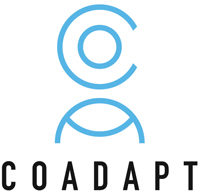Overall objective: Provide a framework that guide the development of co-adaption resources in the work environment as well as personal life to support active ageing.
OBJ 1. Propose a comprehensive CO-ADAPT framework to support change for healthy ageing that describes types of adaptations required in work environments and how to approach adaptation of ageing citizens in form of change behaviour and learning ICT. The framework is produced as a participatory effort including relevant stakeholder representative including prospective ageing users.
Measures and verification. The framework is synthesized in a publicly available report and in a longer form in a journal by the end of the project. It is informed by the concepts of Work Ability and Healthy Ageing and includes a core role of ICT for empowerment of ageing citizens. The framework details psychological, physiological, organisational, social and gender aspects accounting for mutual benefits in quality of life of ageing workers as well as job longevity for employers.
OBJ 2. Create a personalised conversational application with comprehensive change support for ageing citizens based on data analytics focusing on high-level strategies and latest change psychology approaches considering wellbeing and digitalisation across work and personal life. Studying cross cultural applicability by evaluating the CO-ADAPT application and adaptations in work systems in two different cultural context in Italy and Finland.
Measures and verification. The target is to integrate in one system guided by a conversational agent available knowledge on intervention programs on wellbeing and ICT literacy with continuous analysis of physiological measurements and user interactions. A trial in two countries with over 200 participants will demonstrate a 2 digit percent improvements on wellbeing and quality of life as measured by established questionnaires, user and sensors logs, ICT literacy and user satisfaction.
OBJ 3. Develop secure and GDPR compliant AI techniques capable to contextually recommend change programs. The techniques provide advanced user modelling and contextually relevant recommendations based on physiological data, users interaction such as conversations of users data.
OBJ 4. Investigate three types of smart adaptations in work systems to age thresholds, to individual capabilities, information adaptations to tasks for cognitive augmentation aiming at 2 digits percent improvements on most indexes:
- OBJ 4.1 Evaluate how interactive smart worktime planning tools that support individual work-time control and guidelines for health-promoting working hour practices improve the capabilities and well-being of ageing shift workers.
Measures and verification. In an extensive deployment (N=20 000) two digits improvements will be targeted in reduction on sickness absence, work ability, mental health, sleep and work-life interaction.
- OBJ 4.2 Evaluate adaptive assembly workstation with collaborative robotics to ageing workers cognitive and ergonomic capabilities.
Measures and verification. A prototype assembly station will be set up to evaluate how the adaption of speed to cognitive load measured through eye tracking improve wellbeing at work by reducing fatigue and improving the quality of work. Two digits improvements are targeted in error reduction and satisfaction.
- OBJ 4.3 Evaluate adaptive information management systems, which support ageing workers by contextual recommendations of people to contact, tools to be used, documents and other work-related entities.
Measures and verification. In a study (N=120) the measures will include quality of the recommended information, usefulness and influence of the system with respect to the tasks, and users’ subjective experience with the recommender system. Two digits improvements on task performance and satisfaction.
